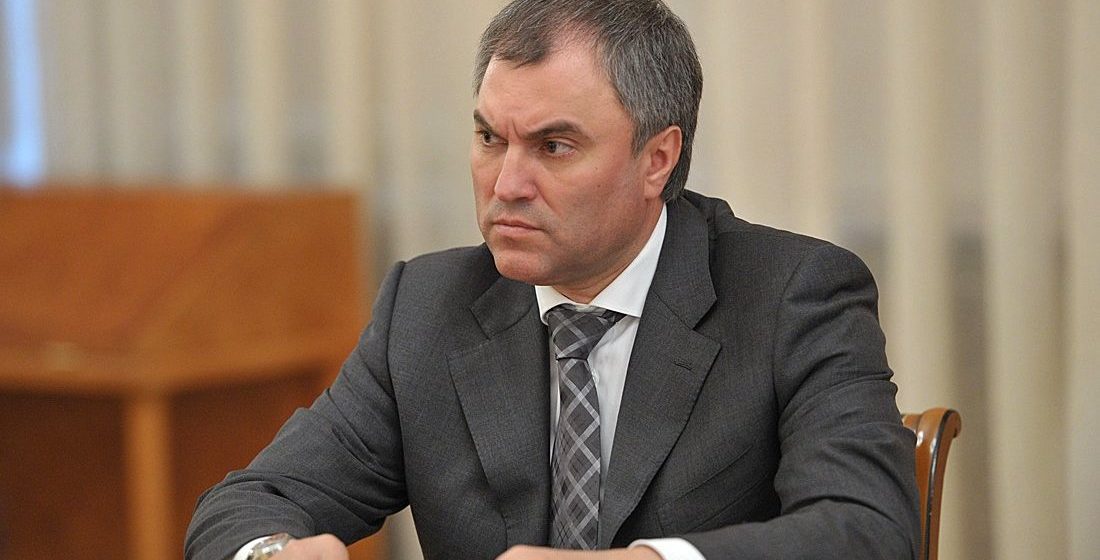Vyacheslav Volodin has big plans for the State Duma. Since his October 5 election, the new chairman of the Federal Assembly’s lower chamber has directed a raft of changes aimed, it seems, at improving the Duma’s political stature. These reforms touch on all the core functions of legislatures: representation and linkage; executive oversight and control; and policy-making. The past proliferation of derogatory monikers like “rubber stamp,” “rabid printer,” and legal “conveyor” belt reflect the popular perception that the contemporary Russian federal legislature is an ineffectual institution – a body stuffed with inactive deputies, whose task is simply to distract citizens from real decision-making processes. In August 2016 – the month before parliamentary elections – only 37 percent of respondents to a Levada survey approved of the Duma’s activities.
One simple reading of these changes is that it’s purely a public relations stunt – an effort to stamp the new chair’s identity on a much-maligned body. This is Volodin’s Duma – not Naryshkin’s, not Gryzlov’s, not Seleznev’s, not Rybkin’s. And not the Presidential Administration’s. As a former first deputy chief of staff in the Presidential Administration (PA), Volodin is well aware of the PA’s capacity – and desire – to micro-manage Duma politics. The Administration’s drafting of, and support for, legislative initiatives formally sponsored by deputies was one such way in which the Kremlin directed legislative politics from a distance. Do Volodin’s reforms go much beyond symbolic PR?
Many of the changes seem to be an attempt to balance professionalism and prestige. Thus, on the one hand, Volodin has cancelled the Duma’s traditional New Year’s party; the summer vacation might be shortened; United Russia has formalized measures to filter legislative initiatives, partly with a view to limiting the emergence of odd, PR-motivated bills; opportunities for deputies to miss plenary sessions and vote by proxy have been significantly reduced, with the penalty of pay deductions for absenteeism; and deputies are now required to deal personally with appeals from citizens. However, on the other hand, deputies have been returned the right to use VIP lounges in airports; the number of cars with migalki – blue flashing lights with sirens, that give priority through traffic – has gone up; more money will be available for law-making expertise; the number of parliamentary advisors and aides will also rise; and Government ministers and their deputies might be required to present and discuss their legislative initiatives in Duma committees. Before making the Duma a “place for discussion,” therefore, Volodin appears set on making the Duma appear to be a place for serious work – or, at least, more serious than recent prior convocations.
Deputies have begun to grumble, however. This is, in part, tied to the difficulties associated with working in regional constituencies, now that the number of weeks for such work in the monthly parliamentary cycle has been reduced from two to one – a particular challenge for deputies representing citizens in federal subjects far from Moscow. More generally, some deputies have balked at the increased discipline instigated during the first legislative session of the seventh convocation. Possibly as a result, the number of sick days taken by deputies has increased markedly since fines were introduced for missing plenary Duma sessions without a valid excuse. (For those legislators that have shown up, the high attendance numbers have caused problems in the Duma lifts and dining room.) One United Russia deputy – Aleksandr Skorobogatko – has even given up his mandate, ostensibly in response to the inflexibility of Volodin’s new regime.
This reaction speaks to the nature of the changes. The Volodin reforms are top-down, bureaucratic-administrative reforms, which appear to be motivated more by efforts to consolidate the speaker’s power vertikal, rather than to foster parliamentarians as champions of constituents’ concerns and influential political actors in their own right. If there is any desire on the Kremlin’s part to make the Duma a “place for discussion,” then this renewed debate will be tightly controlled. Discussion, according to Putin, should be aimed at solving important tasks, rather than being an end in itself. And there is a sense that deputies will have more room for discussion on economic issues important to the regions, whereas they will present a united front on security and foreign policy. In effect, this is an example of something Princeton political scientist Rory Truex calls “representation within bounds” – when deputies are encouraged to act as genuine citizen representatives, but only regarding areas outside the core concerns of the regime, including political reform. Indeed, in an example suggesting that the rhetoric of change might have outpaced the reality of reform, a presidential bill regarding criminal responsibility for improperly launching criminal cases was recently adopted by the Duma without amendment, in spite of calls for significant changes voiced by the lead committee and the Duma’s Legal Department.
A similarly ambiguous change involves the mooted ban on covert bill initiation by Government departments. In order to circumvent the oftentimes arduous process of intra-Government sign-off, ministries and other executive bodies have reverted to introducing their policy initiatives through deputy proxies. Both core executive actors and Duma leadership have complained about this backdoor route which diminishes core executive control over policy-making and can lead to the displacement of intra-executive disagreements into the legislature. There are three clear problems with attempting to stop this practice, however. Firstly, executive actors could simply learn to do a better job of covering their tracks when introducing bills through deputies. Secondly, a united executive sometimes introduces initiatives – often unpopular measures – through other formal bill sponsors. If the executive itself takes advantage of this covert practice, then it is unlikely to be an effective champion of effective reform. And thirdly, it is not clear whether this clampdown will also involve amendments made to bills during second reading, which sometimes modify bills beyond recognition. If it does not, then the proposed reform regarding bills will have little effect, since executive actors will be able to achieve the same goal by other means. Aleksandr Shokhin – President of the Union of Industrialists and Entrepreneurs – has often voiced criticism of such practices in audiences with Putin. In spite of promises for reform, however, little has changed – and it is far from certain that significant results will be achieved in the near future.
In November 2016, approval of the Duma’s activities saw an increase to 44 percent. It is not clear, however, whether this increase can be attributed to Volodin’s reforms: a similar rise in approval for the activities of President Putin, Prime Minister Medvedev, the Government, and regional governors suggests a broader shift in support for political institutions and individuals, rather than a localized response to the appearance of increased parliamentary professionalism.
This article was first published by The Intersection Project.







